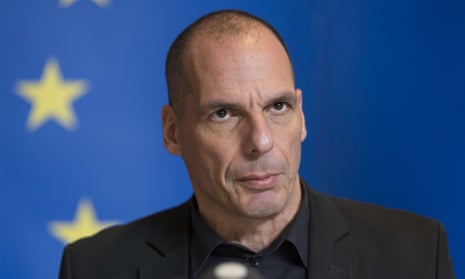Australia is a “plaything” of forces it cannot control as the world economy heads into another phase of the global financial crisis, according to the former Greek finance minister Yanis Varoufakis.
The “remarkable” flow of overseas money into the economy in recent years had created a “false sense of well-being”, he said, but the economy needed to change direction quickly to avert a crisis.
Varoufakis, who quit as finance minister after a tumultuous six months in charge of the near-bankrupt Greek economy, taught economics at Sydney University for 12 years up to 2000 before he returned to Europe in dismay at Australia’s turn to the right under John Howard.
The economist, who has dual Greek and Australian citizenship and whose daughter lives in Sydney, said Australia had become “complacent” about the health of its economy.
The Sydney and Melbourne housing boom, where price growth has been in double figures, was particularly alarming, said Varoufakis, who is in Australia for a short speaking tour.
“Australia – especially Sydney and Melbourne – has always insulated itself from facts about the world. Aided and abetted by the remarkable flow of capital towards the property market in Sydney and Melbourne, it has created a false sense of wellbeing,” he told the Guardian.
“People have always said to me that Australia is immune to the crisis because during the good times money has come as an investment. Then if things go wrong the rich Chinese will emigrate here and bring their dosh with them.”
But Australia had become a “plaything of forces out of its control”, he said, and risked an economic shock as the credit bubble created by China in the wake of the global financial crisis began to deflate.
“The crisis of 2008 won’t go away. It is a unified, solid crisis, although it is metamorphisising and changing. Between the 80s and 2008 the world economy was fuelled by US debt, then financialisation [the huge increase in credit] which created a pyramid of money which collapsed in 2008.
“The world economy lost its capacity to create demand for factories, but China reacted by creating a huge bubble. They were hoping the west would stabilise but it didn’t because America is ungovernable and Europe even more so.”
After his bruising experience trying to face down the might of Germany, the European Central Bank, the European Union and the IMF, Varoufakis has become an outspoken critic of economic policy.
He has described the settlement imposed on Greece in July as doomed to failure and will “go down in history as the greatest disaster of macroeconomic management ever”.
Echoing the call for innovation by new prime minister Malcolm Turnbull, Varoufakis said Australia should redirect its economy from “rent” in the shape of selling commodities to “entrepreneurial profit” in the form of greater innovation.
“Australia has excellent pockets of innovation such as CSIRO. But there is a glass ceiling where they usually have to sell up and move to the US in order to progress.
“It was Paul Keating who said Australia needed to move from being the lucky country to being the smart country. But the government didn’t help that and Australia still has a problem taking ideas to the next stage.”
Yanis Varoufakis will be appearing in conversation with Mary Kostakidis at Melbourne’s Athenaeum Theatre on 28 November (wheelercentre.com) and the Sydney Opera House on 29 November (sydneyoperahouse.com)

Comments (…)
Sign in or create your Guardian account to join the discussion